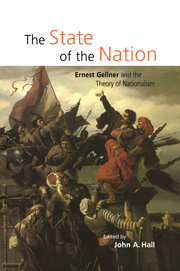Book contents
- Frontmatter
- Contents
- List of contributors
- Introduction
- Part I The making of the theory
- 1 Thoughts about change: Ernest Gellner and the history of nationalism
- 2 Ernest Gellner's diagnoses of nationalism: a critical overview, or, what is living and what is dead in Ernest Gellner's philosophy of nationalism?
- Part II The classical criticisms
- Part III Bringing politics back in
- Part IV Wider implications
- Bibliography of Ernest Gellner's writings on nationalism
- Index
1 - Thoughts about change: Ernest Gellner and the history of nationalism
Published online by Cambridge University Press: 05 December 2011
- Frontmatter
- Contents
- List of contributors
- Introduction
- Part I The making of the theory
- 1 Thoughts about change: Ernest Gellner and the history of nationalism
- 2 Ernest Gellner's diagnoses of nationalism: a critical overview, or, what is living and what is dead in Ernest Gellner's philosophy of nationalism?
- Part II The classical criticisms
- Part III Bringing politics back in
- Part IV Wider implications
- Bibliography of Ernest Gellner's writings on nationalism
- Index
Summary
…two of the great myths of the nineteenth and twentieth centuries, namely Marxism and nationalism.
Today, a third of a century since its publication in 1964, Thought and Change can be seen as Ernest Gellner's magnum opus, a work that contained the nucleus of not only Nations and Nationalism but also of an even later Plough, Sword and Book. Its initial reception, however, appears to have been lukewarm: Brendan O'Leary says that Gellner's theory of nationalism presented there ‘went largely unnoticed‘ among political scientists, philosophers and sociologists. Something similar probably may be said also about its reception among historians. This chapter, however, is not even a beginning of an investigation of that question. Instead, this is a personal account, written twenty-eight years after the story began, of how one historian's encounter with Thought and Change, first read by him in 1968, had put him on a ‘train of thought’ in the course of which he formed, for himself, a view of the history of nationalism and Marxism, which he then presented in his teaching and writing.
It is common for one book to become the stimulus for another writer to write another book in roughly the same area and on the same (or a related) topic. But in this case something different happened. Here a philosophical and sociological argument by a theorist inspired a historian to design a concrete historical investigation that was not even aimed at ‘testing’ the theorist's thesis, let alone at formulating another general proposition.
- Type
- Chapter
- Information
- The State of the NationErnest Gellner and the Theory of Nationalism, pp. 23 - 39Publisher: Cambridge University PressPrint publication year: 1998
- 5
- Cited by



